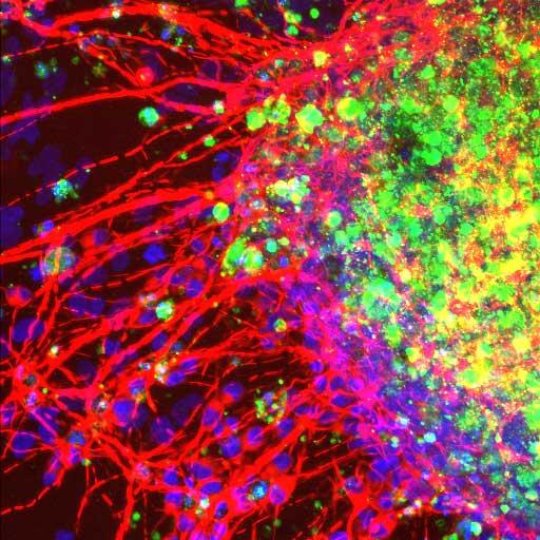Cranial neural crest cells — which give rise to the bones and cartilage of the skull — are vulnerable to Zika virus, report Stanford University School of Medicine researchers September 29 in Cell Host & Microbe. The discovery, made by infecting in vitro cultures of human cells, offers a potential mechanism for how children born with the virus can have smaller-than-average skulls and disproportionate facial features.

Credit: Rachel Greenberg
The researchers also found that Zika has slightly different effects on cranial neural crest cells compared to neural progenitor cells, which have received much attention due to their connection with microcephaly. While the virus rapidly kills neural progenitor cells, infection of cranial neural crest cells does not lead to high rates of cell death. Instead, Zika causes them to secrete signaling molecules that promote the formation of new neural cells. In cell culture, elevated levels of these molecules were enough to induce premature differentiation, migration, and death of human neural progenitors.
“In addition to direct effects of Zika virus on neural progenitors and their derivatives, this virus could affect brain development indirectly, through a signaling cross-talk between embryonic cell types,” says co-senior author Joanna Wysocka, a chemical and systems biologist at the Stanford University School of Medicine. “Neural crest cells are one example, but such mechanisms may also be relevant to other tissues that come in contact with the developing brain during head formation and could be infected by Zika virus.”
Wysocka and co-senior author Catherine Blish, a Stanford clinician-scientist, were interested in studying cranial neural crest cells because during embryogenesis they form the majority of bone and cartilage of the head and communicate with the developing brain. They hypothesized that infection of cranial neural crest cells by Zika could cause the disruption in this communication.
“Our in vitro studies raise an intriguing possibility that the Zika virus can infect human cranial neural crest cells in the developing embryo, which in turn could influence brain development through altered paracrine signaling — and also potentially directly affect development of craniofacial structures,” Wysocka says. “As neural crest cell formation occurs during a specific window of embryogenesis (namely, the first trimester, which intriguingly has been correlated with poor birth outcomes in Zika-infected mothers), we do not anticipate similar effects in adults.”
While an interesting line of future study, the authors emphasize that they have no direct proof that Zika virus infects cranial neural crest cells in animals or humans, nor evidence that such infection would be sufficient to result in microcephaly.
Web Source: Cell Press.
Journal Reference:
Nicholas L. Bayless, Rachel S. Greenberg, Tomek Swigut, Joanna Wysocka, Catherine A. Blish. Zika Virus Infection Induces Cranial Neural Crest Cells to Produce Cytokines at Levels Detrimental for Neurogenesis. Cell Host & Microbe, 2016; DOI: 10.1016/j.chom.2016.09.006
The post Zika infects neural cells related to skull formation, affecting their function appeared first on Scienmag.





